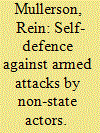|
|
|
Sort Order |
|
|
|
Items / Page
|
|
|
|
|
|
|
| Srl | Item |
| 1 |
ID:
121749


|
|
|
|
|
| Publication |
2013.
|
| Summary/Abstract |
The European Union has become an important leader in international environmental affairs - particularly through the negotiation of multilateral environmental agreements (MEAs) with favourable terms. In this article, EU environmental leadership is studied from a new perspective, focusing on the ratification stage of environmental regime formation. Specifically, it investigates whether the EU is also capable of motivating third states to join its preferred MEAs. It is argued that third states join the EU's preferred MEAs to signal their compliance with EU environmental standards in an effort to become eligible for various rewards that the EU could potentially offer, including a credible membership perspective, access to its lucrative markets, and aid and assistance. The argument is tested by examining the ratification behaviour of 25 non-EU Member States with regard to all 21 MEAs negotiated under the auspices of the United Nations Economic Commission for Europe (UNECE). The results provide robust support for the theory that EU rewards motivate third states to ratify these treaties. The results withstand a number of statistical tests, even when alternative explanatory factors such as trade intensities, transnational communication and geographic proximity are controlled for. The study is the first large-scale demonstration of the EU's external influence at the ratification stage of environmental regime formation. By identifying three different channels of EU influence, the research permits a more refined understanding of the EU's role as a promoter of environmental protection standards.
|
|
|
|
|
|
|
|
|
|
|
|
|
|
|
|
| 2 |
ID:
171255


|
|
|
|
|
| Summary/Abstract |
Armed attacks in the sense of Article 51 and customary international law can be carried out not only by States, but also by non-State actors (NSA). Self-defensive responses to attacks by NSAs, due to their specific characteristics, may contain a combination of elements of anticipatory self-defence and defensive reprisals. If a State, from the territory of which an attack originates, is unable to prevent an NSA attacking a third State, it has to ask for and to accept the assistance of the victim State, other States, or relevant international organisations. The latter cannot use military force in self-defence in such circumstances without having first sought the consent of the territorial State. However, if a State is unwilling to prevent an NSA, operating from its territory, from attacking third States, it becomes an accessory-after-the-fact to armed attacks of the NSA. Self-defensive, either individual or collective, measures can be carried out on the territory of such a State even without its consent.
|
|
|
|
|
|
|
|
|
|
|
|
|
|
|
|
|
|
|
|
|